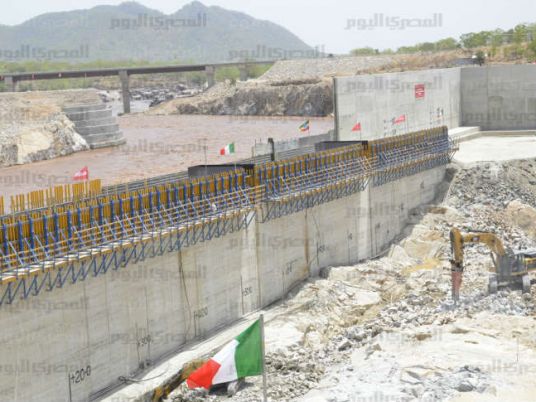
The principles document to be signed by the Egyptian, Sudanese and Ethiopian leaders would harm Egypt's interests and would be a political victory for Ethiopia, experts have said.
The document indicates that Egypt condones the prior notification principle, as well as the principle of "do no harm", said Al-Ahram Center for Political and Strategic Studies adviser Hany Raslan.
References in the document on the principle of water equity and fair usage as a governing principle will lead to the marginalization of the prior notification principle and result in a lot of confusion when determining whether the amount of water headed to Egypt will harm its interests, says Raslan.
Signing the document is a recognition of the Renaissance Dam with its current water capacity. Ethiopia could establish other dams in the future relying on the precept which states the sovereignty of countries, he said.
Ethiopia has been maneuvering since the start of this crisis, Raslan mentioned. The document is only in favor of Ethiopia.
Signing the document is a serious setback for Egypt, with regards to water issues. It threatens future generations and offers unprecedented concessions to Egypt's rights, starting a new phase where Ethiopia will practice absolute dominance on the Blue Nile.
The general principles referred to in the document are loose and can be explained in various ways. There must be an agreement that achieves a balance of interest and achieves the development of Ethiopia without harming Egypt, Raslan added.
If Egypt signs the principles document, Ethiopia will reach its goal by achieving a clear political victory, said Egypt's former Irrigation Minister Mohamed Nasr Eddin Allam.
The document will have real implications on the future of the Egyptian people, Allam added. It has completely neglected talk on the capacity of the dam, merely mentioning that the issue has to do with Ethiopia's sovereignty.
The only party which will benefit from the document is Ethiopia. This is not a development of relations with African countries, but a clear surrender to Egypt's rights, said Allam. "We hope economic cooperation with Ethiopia will not include the import of electricity generated by the dam," he added.
The document did not mention Egypt's rights as stated in historical agreements, such as the 1902 agreement where Ethiopia pledged not to build dams on the Blue Nile or Sobat river without Egypt and Sudan's consent, Allam pointed out.
Allam also referred to European and American studies that have proven how the contruction of the dam will harm Egypt and Sudan. The principle of "do no harm" has no value as long as Ethiopia denies Egypt's share of water, he added.
Edited translation from Al-Masry Al-Youm




